In March 2022, when Ukraine was desperately fighting off Putin’s invasion, a drama of its own happened in several families of Crimea, which was occupied eight years ago. The Southern District Military Court in Rostov-on-Don sentenced five Crimean Tatars in the criminal case of Hizb ut-Tahrir, an Islamic organization banned in Russia. They received from 15 to 19 years of imprisonment. Citizen journalist Remzi Bekirov, who, all this time, maintained close contact with the media community of mainland Ukraine, was sentenced to 19 years in prison. Since Remzi‘s arrest, his wife Khalide Bekirova has been fighting for his freedom. She told us about how the life of the family has changed since 2014.
Searches, arrests, trials
Remzi Bekirov, speaking in court debates, emphasized that most of the defendants in his case are members of Crimean Solidarity. This informal social movement arose in Crimea after Russia’s annexation of the peninsula. “The activities of this people’s initiative were limited to highlighting the terrorist and provocative activities of the FSB, CCE (the Russian state “Center for Countering Extremism” – Ed. note) and the Russian government in general in Crimea in relation to the Crimean Tatars, Muslims, and all dissidents, visiting courts, places illegal searches, conducting prayers, organizing transfers to pretrial detention centers. It was this legal activity, together with our position in life, that became the real reason for our arrest,” the Russian opposition online publication Grany.ru, of which he was a freelance correspondent, quoted Bekirov as saying. In addition, Bekirov posted materials on the resources of Crimean Solidarity – the website crimean-solidarity.org and on its pages on social networks aired on the ATR channel and other Ukrainian TV channels.
The accusation of Remzi Bekirov was based only on the testimony of secret witnesses and hidden audio recordings of conversations. This was already the ninth Crimean case of Hizb ut-Tahrir, whose supporters the Russian authorities have been trying to persecute on the peninsula since 2014.
Bekirov was detained on March 28, 2019, after the day before his house was turned upside down in the village of Strohanivka, Simferopol District. On March 27, FSB officers conducted a “special operation” with simultaneous searches of almost 30 addresses throughout Crimea. No evidence of terrorist activity was found while searching Remzi‘s home. He and the other four Muslims would later be convicted solely based on Hizb ut-Tahrir ideology. This international Islamic political organization aims to unite Muslim countries in an Islamic caliphate, but its members reject any terrorist methods to achieve this.
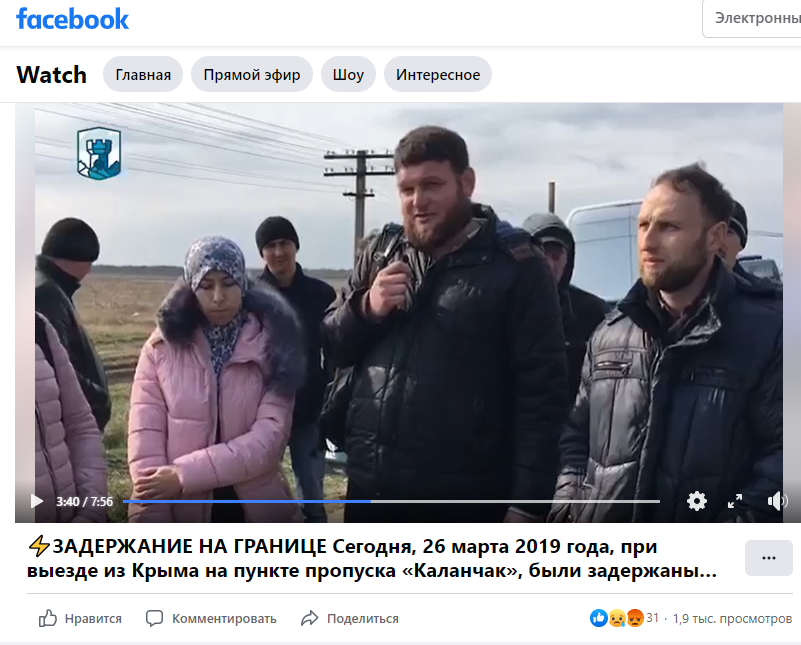
Even earlier, on March 26, Remzi, his wife Khalide, and friend and associate Ruslan Suleymanov were detained for half a day without explanation at the administrative border between the annexed Crimea and Ukraine. All of them are citizens of Ukraine. Crimean Tatars went to Kherson to get ready-made foreign passports. However, the Crimeans were turned back home at the border crossing. The next day, at six in the morning, armed men in masks broke into the Bekirovs’ apartment.
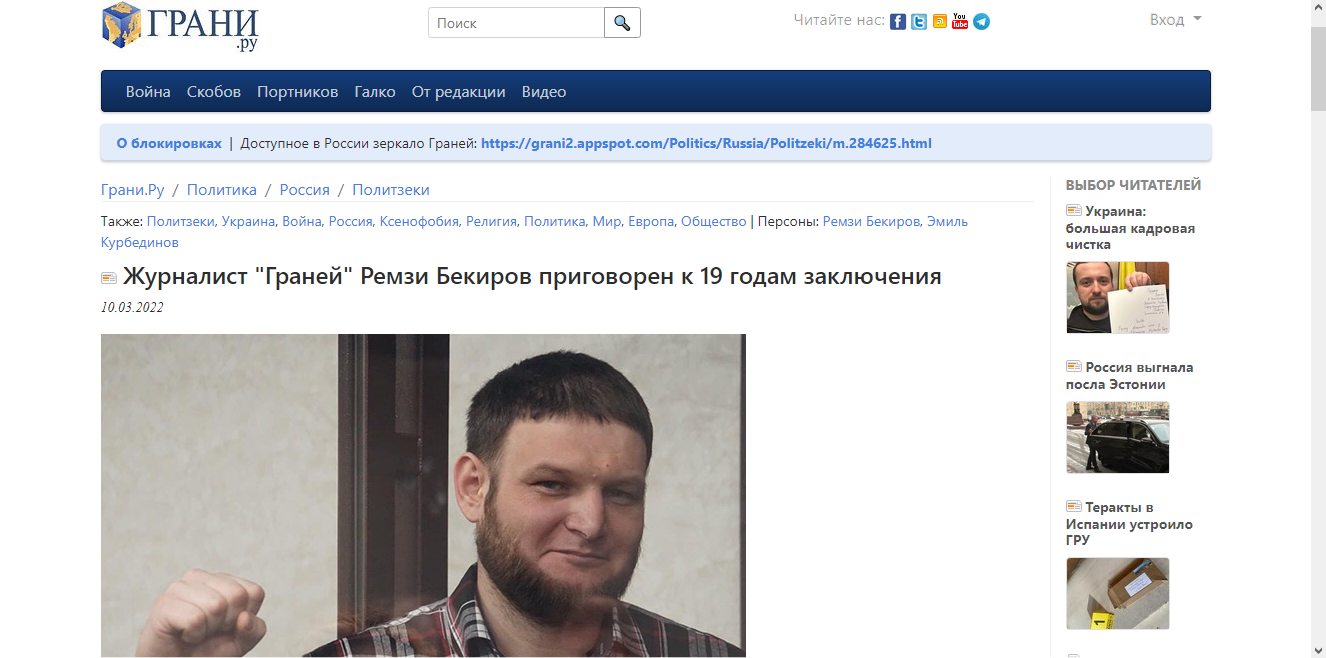
It will soon be four years that 38-year-old Remzi has been held in various Russian pretrial detention centers. At the time of our interview after the trial, he was in the pretrial detention center in the city of Novocherkassk, awaiting the appeals court. Then, most likely, he will be sent to a colony – somewhere in the north of Russia, as has already happened to many Crimean Tatars convicted for their political views. He has three young children left at home.
“For four years now, I, like other wives of political prisoners, have had to bear the burden of parenthood instead of Remzi,” says Khalide Bekirova.
Sympathizing human rights defenders, journalists, artists
“Remzi began to actively cover the persecution of the Crimean Tatars in the mass media, the court proceedings against them since 2016,” recalls Khalide. “He is a historian by education, graduated from Tavriiskyi National University named after Vernadskyi. But when the oppression of our people began, my husband involuntarily became a citizen journalist. I picked up the phone and went to searches, courts – to events that worried our people, mainly when our compatriots went missing. After receiving a press card at the beginning of 2019, he could enter the courtroom and cover politically motivated cases regarding the Crimean Tatars and other innocent citizens.
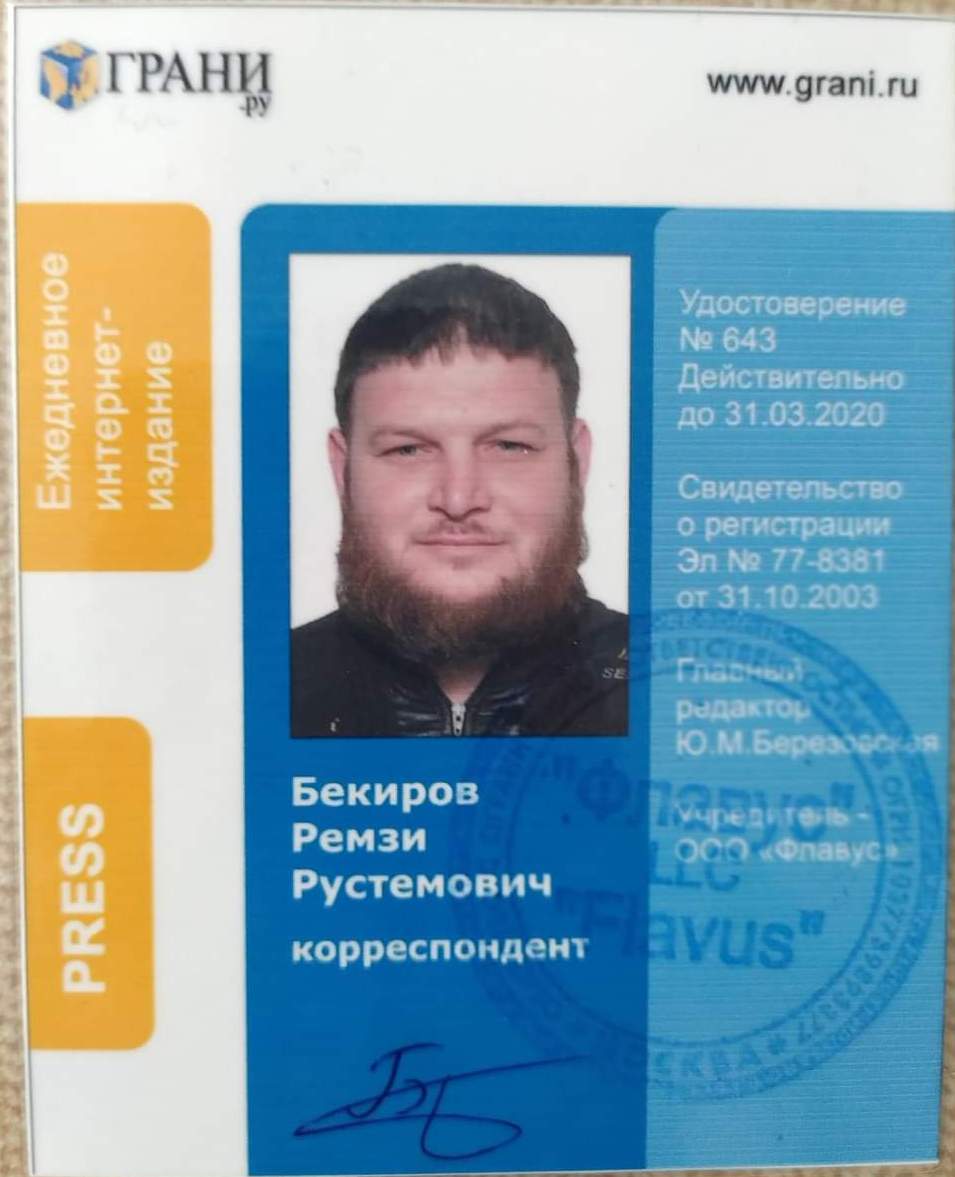
As Bekirov‘s wife says, Remzi received threats and “warnings” from the special services long before the arrest to stop his media activities. The man did not stop and, in 2017, received two administrative arrests. One is for a VKontakte post from seven years ago, which was already deleted along with the account. Despite this, the activist was sentenced to three days behind bars for publishing the post. He received the second sentence – five days in prison – for streaming the search of his friend Marlen Mustafayev. Formally, for participating in an unauthorized rally in support of this person. These were the first signs before Remzi himself went to prison for years.
Public support for the Crimean Tatar activist during his captivity was expressed by the international organizations Reporters Without Borders, the Committee for the Protection of Journalists, and the human rights organization Freedom House. The Russian human rights center Memorial (by the way, closed by the decision of the Russian court at the end of 2021) managed to count Bekirov among political prisoners.
The Ukrainian media community also supported Remzi Bekirov: at the end of 2019, together with his colleagues, he was announced as a collective laureate of the National Prize for the Protection of Freedom of Speech named after Igor Lubchenko, organized by the National Union of Journalists of Ukraine (NUJU). In response, Remzi sent the Union a letter of thanks, which was later posted on nsju.org. In the message, Bekirov emphasizes that citizen journalism on the peninsula has remained, in fact, the only source of truthful information about the life of the Crimean Tatars since 2014. Independent professional media were liquidated or could not withstand the authorities’ pressure and closed down.
And in December 2021, a photo exhibition called Citizen Journalists Are Important was held at the main office of the NUJU on Khreshchatyk Street, where portraits of citizen journalists from Crimea and their family members were exhibited. The wives of repressed citizen journalists, including Khalide Bekirova, were invited to the opening.
A little earlier, in the fall of 2021, the premiere of the dramatic work Crimea, 5 AM by Ukrainian authors Nataliya Vorozhbyt and Anastasiya Kosodii, written based on their interviews with the families of Crimean Solidarity activists, members of the Mejlis of the Crimean Tatar People and Crimean Tatar intelligentsia took place in Kyiv. The Ukrainian Institute organization, whose cultural activities are aimed abroad, together with the Ministry of Foreign Affairs of Ukraine, planned to show this modern documentary performance in Europe as part of the activities of the Crimean Platform. However, the situation in Ukraine from the end of February 2022 prevented the shows.
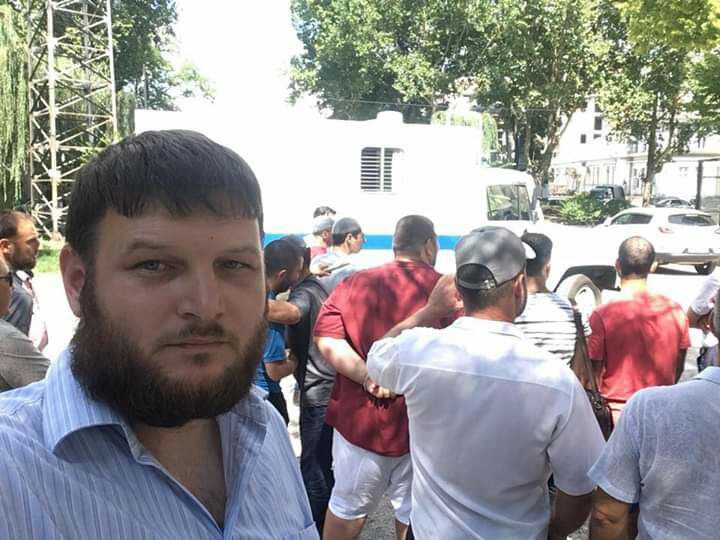
“Our struggle is not violent”
While in prison, Remzi does not stop his journalistic and journalistic activities. According to his wife, he keeps diaries – he records how unfairly the Russian judicial system acts in relation to political prisoners. A separate diary is devoted to life in detention centers. The author releases his records through a lawyer. Khalide Bekirova dreams of publishing them as a book with the tentative title Political Prisoner’s Notes.
“Reading the diary, I understand that we have no idea what events are happening there, in the cells. Often, it is not political prisoners who are “settled” there, but real criminals one must find a common language with,” the woman says.
“Here, being free, we are fighting for the freedom of both my husband and our brothers in faith, our compatriots. This is our peaceful, non-violent struggle,” emphasizes Khalide. “Citizen journalists like Remzi are being replaced by many who today suffer from repression against our people. We, wives of prisoners, try to give interviews and go to conferences to highlight the position of our husbands. After all, today, we are their voices. We are grateful to Remzi‘s colleagues from the NUJU for the photo exhibition and for the fact that the Union continues to talk about Crimean political prisoners.
Children must know that their parents are not terrorists
By profession, Khalide is a mathematician, computer scientist, and programmer. She worked remotely as a tutor in these disciplines and taught mental arithmetic classes for a long time. In addition, she has been studying Arabic for many years and already teaches it to children and adults. Khalide‘s knowledge was helpful in the Crimean Childhood non-governmental organization established after 2014 to support Crimean Tatar children persecuted for their political views. In it, Khalide and other women take care of the education and upbringing of young Crimeans whose parents are imprisoned in Russian prisons. What children should have in ordinary life – lessons, exciting contests, quizzes, and gifts they receive in the community created for them by adults. But the main thing is that children should never feel like “terrorists’ children,” as the “authorities” claim.
Remzi Bekirov‘s wife brings up her children – sons Muhammed (13 years old), Salahuddin (10 years old), and 8-year-old daughter Safiye – in the same spirit.
“We tell our children everything directly, without hiding anything,” says Khalide. “We explain that their father was sent into captivity because of his freedom-loving position, defense of justice. We say that he is not a criminal and is in prison because he did not get scared and did not stop covering the situation in courts and illegal searches. The children attended more than one court session regarding their father and other political prisoners. Living in our repressive Crimean reality, children understand everything. When he grows up, the eldest son Muhammed already wants to become a journalist like his father and cover the oppression of our people.”
The kind words and deeds of fellow believers largely support the Bekirov family.
“Not only relatives and friends but also completely unfamiliar compatriots do not remain aloof: some will bring food, some will bring necessary things,” says Khalide. “But the most important thing is that we are not considered the family of a criminal; everyone understands that we suffered from the repressive machine.”
What changed in 2022?
Khalide rightly notes that the repression in Crimea and the situation that has developed in mainland Ukraine since February 2022 are links of the same chain. However, most of the population did not pay due attention to the oppression and persecution of the Crimean Tatars for eight and a half years in Ukraine. From February 2022, even the small available focus of the mass media shifted to the terrible events on the mainland – this is natural and understandable. But the wife of Remzi Bekirov is sure it is necessary to remember about political prisoners from Crimea, who are held in Russian pretrial detention centers and colonies.
“As pretrial detention centers are filled with new detainees, not only of Crimean Tatar nationality, the cases of my husband and other imprisoned Crimeans seem to go down in this archive of cases of political prisoners and become an archival case,” says Khalide. “However, it is worth understanding that each of them is important. Crimean detainees, like other civilians and military personnel, must eventually be released.”
JOURNALISTS ARE IMPORTANT. Stories Of Life And Work In War Conditions is a cycle of materials prepared by the team of the NUJU with the support of the Swedish human rights organization Civil Rights Defenders.

 THE NATIONAL UNION OF
JOURNALISTS OF UKRAINE
THE NATIONAL UNION OF
JOURNALISTS OF UKRAINE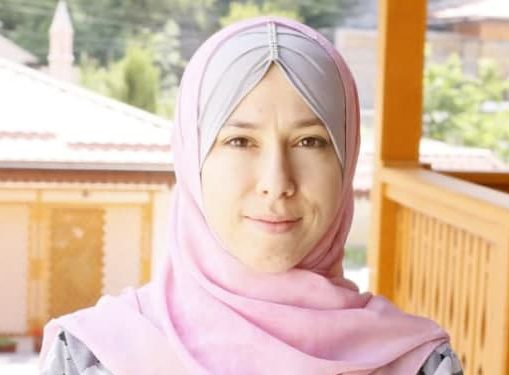
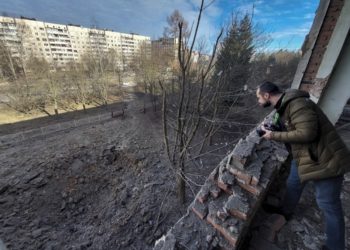
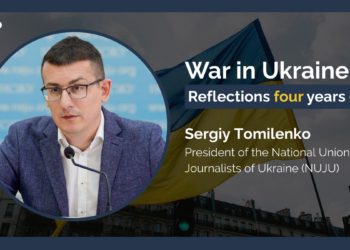
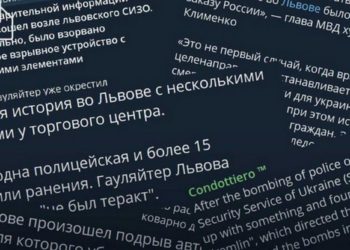













Discussion about this post